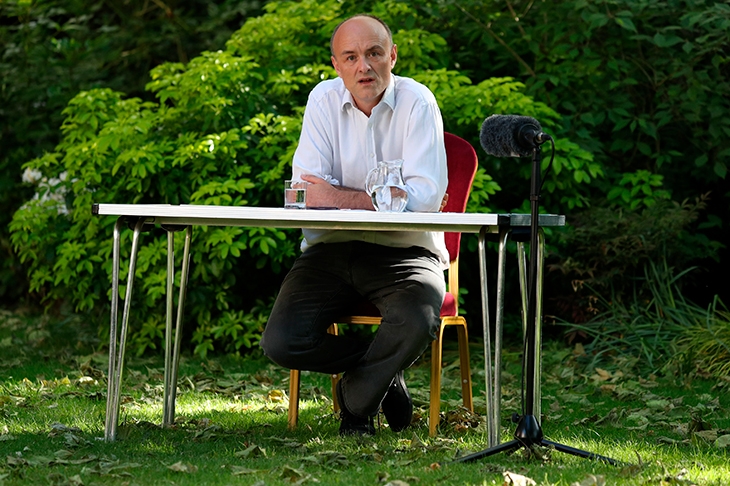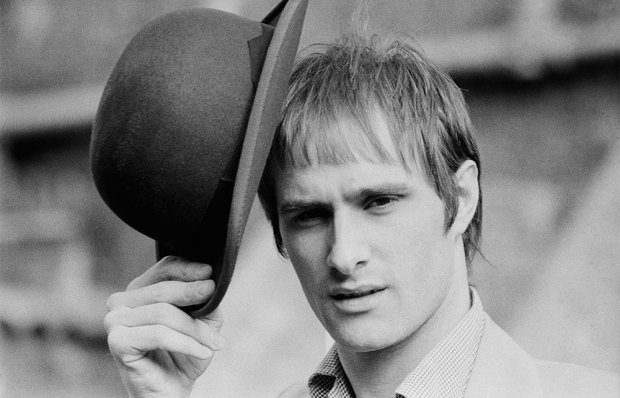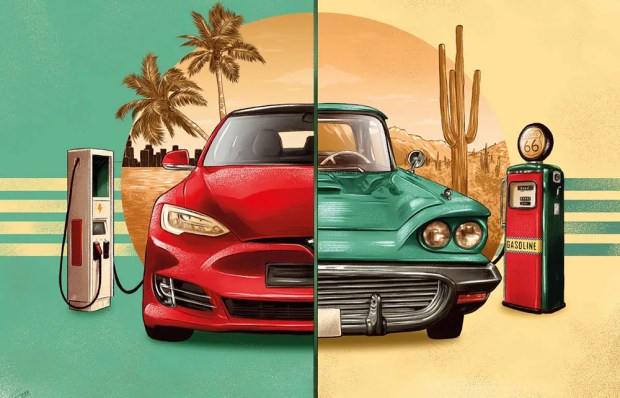I was relieved to discover, earlier this week, that the Prime Minister’s special adviser, Dominic Cummings, was a symbol of inequality in modern Britain. Relieved because I have been scouring the country for such a symbol for ages and had hitherto not succeeded in finding one. Cummings is just that symbol, according to Robert Peston, because his father has a garden with some trees in it. Cummings was thus able to walk through these trees, whereas people who do nothave fathers with a garden with some trees in it are not able to do so. Privileged bastard.
There is, however, one small problem. If Robert were to take a short trip out of London for the first time since 1987 I have the horrible feeling he would discover that several other people also own gardens — indeed, according to the Wildlife Gardening Forum, some 22.7 million households and thus approximately 50 million people. I do not know how many of those gardens have trees, mind, or what sort of trees if they do. And those figures come from a 2008 survey, so it may be that since then vicious Tory austerity measures and Brexit have wiped out all gardens in the UK except for the one owned by Mr Cummings’s dad. Perhaps that is the point Robert was trying to make.
If I’m honest, I think that a former stockbroker who is entitled by birth to call himself the Honourable, was educated at Balliol and the Université Libre De Bruxelles (natch), is extravagantly remunerated, on the TV every bloody night and lives in one of the most expensive square miles of Europe would be ill-advised to identify a symbol of British inequality unless he was directly facing a mirror. Next week Robert is taken to Cumbria and espies another symbol of British inequality. ‘Is it right, at a time when so many people struggle to put food on their plates, that single individuals can own so many sheep?’
Shortly before Robert made his brilliant analysis of inequality in the UK, a Labour staffer called Tara Jane O’Reilly was tweeting about the Cummings affair: ‘No offence, but why would you ever drive north of London twice?’ Why indeed. I have no doubt that there is grave economic inequality in this country — and most of it is rooted in that hideous divide between London, where Tara and Robert and the liberal left hang out, and the rest, where they are largely despised or ignored and people have gardens with trees in them. And Tara — keep going, why don’t you. That’s the way to rebuild that famous red wall.
Meanwhile, as the metro-London left were becoming priapic with outrage over Mr Cummings’s dad’s smallish collection of right-wing trees, the American left was happily engaged in another bout of self-immolation. The presumptive Democratic nominee for the presidency, Joe Biden, told an African-American radio show host ‘you ain’t black’ if you support Donald Trump. Out of the mouths of babes and the senile, then. Biden could not have been more racist if he had blacked up and sang ‘Ah’ll bet mah money on de bobtail nag, doo-dah, doo-dah’ while waving his hands in the air.
Biden has subsequently apologised for trying to be ‘a wise guy’. That was him trying to be wise? What’s he like when he gives up trying? But the damage was done. It is such an obnoxious comment and yet entirely accepted as a kind of truism on the white liberal left, which treats people of colour as if they were children, to be pitied and cared for and endlessly patronised. It is axiomatic that racial equality means the right to vote for who the hell you want regardless of the colour of your skin and that to suggest otherwise is the very core of a racist mindset. As USA Today put it: ‘Biden and the Democratic National Committee seem to look at black Americans just as votes and not as actual people, with brains, feelings and families. Liberal policies have not made it easier for black business owners to navigate fewer regulations, pay less in taxes, and be lifted out of poverty. Liberal policies were not responsible for historic low black unemployment, and the creation of opportunity zones.’
But therein lies the problem: stripped of the black and Hispanic vote it takes for granted, how could the Democrats ever hope to win again, with only the very affluent white East Coast liberals and a few social media billionaires in Portland, Seattle and San Jose? Increasingly, though, the black and Hispanic communities are wising up. It was Republicans who abolished slavery; it was southern Democrats in the 1950s and 1960s who fought to retain segregation. It is the conservatives who espouse traditional family values and a commitment to religious faith, both areas which find favour among black and Hispanic voters. The message is slowly getting through that BAME voters do not need to be clients of an arrogant and frankly racist liberal elite, obsessed as it is with identity politics.
How long before our BAME voters similarly get the message? Not long, you would hope. The same kind of racist spite has been directed at the likes of Rishi Sunak, Sajid Javid and Priti Patel: not properly black or Asian — not if you’re with the Conservatives. You see, if you’re black or Asian you need Jeremy Corbyn to ‘unlock your potential’ because you are quite incapable of unlocking it yourself. I wouldn’t trust Corbyn to successfully unlock the bathroom door. And yet the hyper-liberal policies of the modern left do not remotely resonate with family- and faith-centred BAME communities — especially not with Muslims. The left’s patronage of ethnic minorities is rooted in a kind of Joe Biden-style racism and sooner or later the message will get through — and then there won’t even be a red wall in Tower Hamlets.
Got something to add? Join the discussion and comment below.
Get 10 issues for just $10
Subscribe to The Spectator Australia today for the next 10 magazine issues, plus full online access, for just $10.
Spectator.co.uk/Rodliddle
The argument continues online.
You might disagree with half of it, but you’ll enjoy reading all of it. Try your first month for free, then just $2 a week for the remainder of your first year.















Comments
Don't miss out
Join the conversation with other Spectator Australia readers. Subscribe to leave a comment.
SUBSCRIBEAlready a subscriber? Log in